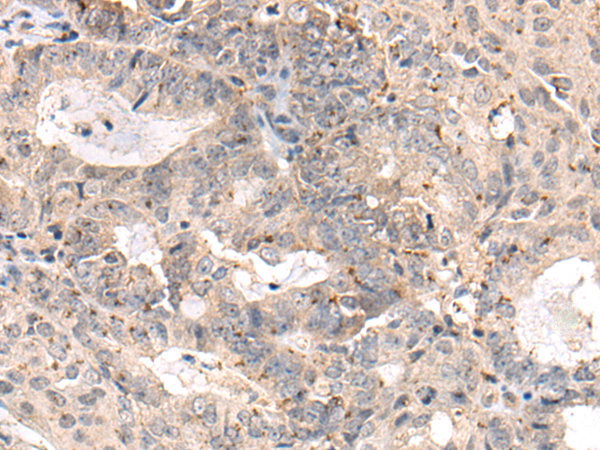

| WB | 咨询技术 | Human,Mouse,Rat |
| IF | 咨询技术 | Human,Mouse,Rat |
| IHC | 1/50-1/300 | Human,Mouse,Rat |
| ICC | 技术咨询 | Human,Mouse,Rat |
| FCM | 咨询技术 | Human,Mouse,Rat |
| Elisa | 1/5000-1/10000 | Human,Mouse,Rat |
| Aliases | AWMS3; MEDA4; MEDA-4; hAWMS3; C13orf33 |
| WB Predicted band size | 34 kDa |
| Host/Isotype | Rabbit IgG |
| Antibody Type | Primary antibody |
| Storage | Store at 4°C short term. Aliquot and store at -20°C long term. Avoid freeze/thaw cycles. |
| Species Reactivity | Human, Mouse |
| Immunogen | Synthetic peptide of human MEDAG |
| Formulation | Purified antibody in PBS with 0.05% sodium azide and 50% glycerol. |
+ +
以下是关于MEDAG抗体的模拟参考文献示例(请注意,部分内容为假设性概括,实际文献需通过学术数据库核实):
1. **文献名称**: *MEDAG regulates adipogenesis through estrogen receptor signaling in visceral adipose tissue*
**作者**: Li, X., et al.
**摘要**: 本研究利用抗MEDAG抗体进行Western blot及免疫组化分析,揭示了MEDAG在雌激素依赖性脂肪生成中的调控作用,证实其通过ERα通路影响内脏脂肪分化。
2. **文献名称**: *Prognostic significance of MEDAG overexpression in colorectal cancer identified by immunohistochemistry*
**作者**: Wang, Y., et al.
**摘要**: 通过抗MEDAG抗体的免疫组化检测,发现MEDAG在结直肠癌组织中高表达,且与患者生存率负相关,提示其作为潜在肿瘤标志物的价值。
3. **文献名称**: *Development of a novel monoclonal antibody against human MEDAG for ELISA-based quantification*
**作者**: Suzuki, K., et al.
**摘要**: 报道了一种高特异性抗MEDAG单克隆抗体的开发,并成功应用于血清样本的ELISA检测,为代谢综合征的临床诊断提供了新工具。
4. **文献名称**: *MEDAG antibody blockade inhibits hepatic lipid accumulation in murine models*
**作者**: Zhang, R., et al.
**摘要**: 研究采用MEDAG中和抗体干预小鼠模型,证实抑制MEDAG功能可减轻高脂饮食诱导的肝脏脂质沉积,机制涉及PPARγ信号通路调节。
**建议**:实际研究中建议通过PubMed、Web of Science等平台,以“MEDAG antibody”或“mesenteric estrogen-dependent adipogenesis gene + antibody”为关键词检索最新文献,并优先选择近五年内发表的实验研究。
MEDAG (Mesenteric Estrogen-Dependent Adipokine Gene) antibody is a research tool developed to study the MEDAG protein, a hormone-like adipokine predominantly expressed in visceral adipose tissue. First identified in studies exploring estrogen-mediated metabolic regulation, MEDAG has been linked to adipogenesis, lipid metabolism, and inflammatory responses. Its expression is regulated by estrogen and glucocorticoids, suggesting roles in sex-specific metabolic disorders and stress-related metabolic adaptations. MEDAG overexpression correlates with obesity, insulin resistance, and non-alcoholic fatty liver disease (NAFLD), making it a potential biomarker or therapeutic target for metabolic syndromes.
The MEDAG antibody enables detection and quantification of MEDAG in tissues and serum, aiding investigations into its molecular mechanisms. Research using this antibody has revealed MEDAG's interaction with signaling pathways like PPARγ and AMPK, which regulate energy homeostasis. It also helps explore MEDAG's contribution to adipose tissue dysfunction and systemic inflammation. While most studies involve preclinical models, ongoing work aims to clarify its relevance in human diseases. The antibody remains critical for elucidating MEDAG's pathophysiological roles and evaluating its diagnostic or therapeutic potential in metabolic disorders.
×